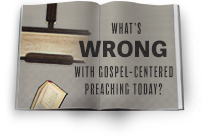The Easy Application Your Sermon Is Probably Missing
In the course of sermon preparation, as you consider applications of the text, who do you have in mind? Maybe you picture particular church members. Perhaps you think of different life stages. You ask, “How does this passage apply to business professionals, young marrieds, youth, parents, grandparents, singles, empty nesters?” Typically, these applications are aimed at how an individual believer might live out God’s Word. But there’s an obvious category that you’re probably overlooking: your church. You might call it corporate, or congregational, application.
Corporate application addresses how God’s Word speaks to a church’s congregational life together. This includes how members relate to one another and work together to live out the Scriptures. It also includes how the church as a whole can apply the text.
Every text has corporate applications. After all, the Bible is a congregational book—written about a people, to a people, for a people. While stories of individuals are scattered throughout Scripture, they’re told within God’s greater work among his people as a whole. From the Pentateuch to the prophets, the Old Testament addresses God’s distinct, covenant people, Israel. From the Gospels to Revelation, the New Testament reveals the formation and deployment of God’s new covenant people, the church. Even the metaphors used for the church in the New Testament—family, kingdom, building, body—are corporate entities made up of individual parts. So our application must address the individual parts as well as the corporate whole.
Let’s take a look at two examples (one OT and one NT):
Psalm 116 is a thanksgiving psalm with abundant applications for the individual believer. It begins as a personal prayer: “I love the Lord because he has heard my appeal for mercy. Because he has turned his ear to me, I will call out to him as long as I live” (v. 1–2). The psalmist goes on to praise God for rescuing him from a hopeless situation and delivering him from the pit of despair. Individual applications include trusting God in the midst of difficulty, crying out to him in moments of need, and praising him for his deliverance.
While it’s an individual prayer, it’s offered in a congregational context. It was a psalm sung in the temple after God had answered an individual’s prayer for help (v. 14). Verses 17–19 show this sacrifice of praise overflowing in the presence of the Lord’s people and in the courts of the Lord’s house, allowing the people of God to celebrate God’s grace and goodness together. So, one corporate application is the value of testimonies within the body of Christ. Another application is that we ought to “weep with those who weep,” walking with them in their moments of affliction. We also ought to “rejoice with those who rejoice,” celebrating God’s mercy and deliverance together.
The Lord’s Prayer (Matt. 6:5–15) contains Jesus’ teaching on how to pray. I’ve heard some amazing sermons from this passage that have dramatically impacted my personal prayer life, but very few highlight its corporate aspects and applications. English translations make it easy to miss because they use the same word “you” for both singular and plural.
In Texas, we have a plural for you: y’all. And when you read the Lord’s prayer in the original language, you’ll find only verse 6 has a singular “you” followed by singular verbs. Everywhere else, Jesus uses “y’all” followed by plural verbs. The addition of “our” and “us” throughout the prayer solidifies its congregational nature. Jesus is giving a picture of what individual and corporate prayer should look like. As a congregation, we pray for one another’s needs to be met and for protection against temptation. Additionally, our forgiveness of one another applies to church unity as well as the process of church discipline.
So, as you prepare your sermon for Sunday and work through application, don’t forget to ask questions like these:
- How should the core truths of this passage shape the congregational life of our church?
- How should this truth shape what we do as a church, why we do it, and how we do it?
- How does this passage affect our polity?
- How does it affect the way we love, care, and interact with one another?
- How does it affect our mission together?









